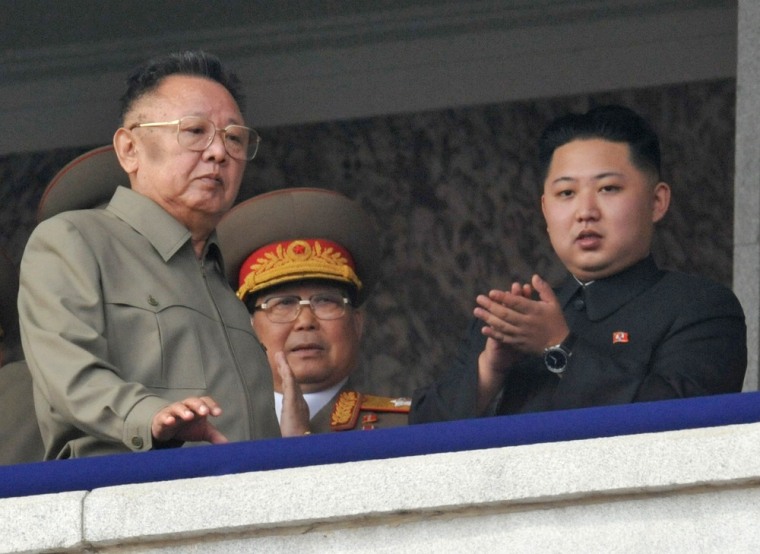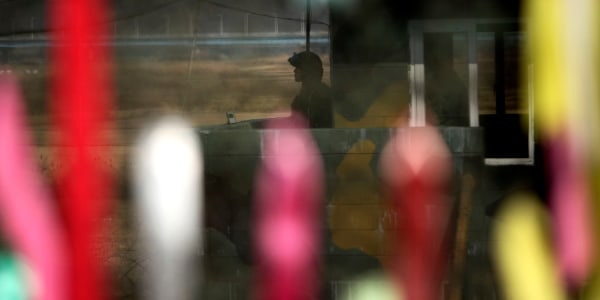North Korea’s Kim Jong Il may be using recent military incidents and the unveiling of a new nuclear facility to accelerate the transfer of power to his 26-year-old son and secure his own legacy by getting a peace treaty that cements North Korea’s legitimacy, according to senior U.S. officials who closely follow the Hermit Kingdom.
These senior officials, who spoke with NBC News earlier this month, say there’s always the possibility of a more dangerous turn in this belligerence, even with this week’s announcement of a renewal of six-party talks. Don’t be surprised, they said, if there is more nuclear testing or whatever else might work to get the attention of other countries, particularly the United States. (See the related blog post: North Korean nukes: big fears, few facts.)
The choice of the location of the recent incidents is no accident.
“This part of the Korean peninsula has been a source of tension for the past two years,” one senior official said. “We cannot be sure why the North and Kim Jong Il decided to do it, except in the context that they have been very clear that they want to challenge South Korea’s claimed sovereignty in the area.”
The November shelling of a South Korean island by the North is the third incident between the two states in a year of increasing rhetoric and tensions: a “shellacking” of North Korea naval vessels by the South Korean Navy in November 2009, followed by the sinking of a South Korea patrol boat in March, with the loss of 46 sailors.
The official added that while the land boundary between North and South was made very clear at the end of the Korean War in 1953, there was no resolution of the maritime boundary. In fact, the recent naval engagements and the Nov. 23 shelling took place in an area that both sides claim but where no other nation, including the United States, recognizes a border.
The North Koreans may have chosen Yeonpyeong Island because it is remote and lightly populated and an attack there would not lead to a larger conflict. They are not acting along the DMZ, where such an artillery barrage would lead to “things degenerating pretty quickly,” making the stakes “much higher there,” the first official said.
That doesn’t mean the incident should be seen as business as usual between the two long time adversaries. It’s not.
It’s the first time U.S. intelligence can determine that the North Koreans have fired artillery onto South Korean territory, the official said. In the past, they have fired small arms across the DMZ and fired artillery into the Yellow Sea.
Why now? Burrowing into the rhetoric has provided clues that Kim Jong Il has decided it’s time to deal with a variety of foreign policy issues before the transfer of power.
The first official said the U.S. has been listening to what groups aligned with the North, particularly a Japanese-based group called Chosun Soren, have been saying. Interestingly, within days after the attack the group called for a peace treaty to officially end the Korean War.
Slideshow 38 photos
Tension in the Koreas
“We saw ‘peace treaty’ pop up again,” the first official said. “We think North Korea would love to be able to enter into negotiations on the overall peace status of the peninsula. It would be in their favor because it would give them recognition, legal recognition internationally, and bolster their claims of being a sovereign state on the peninsula and maybe even resolve this line of demarcation that’s been an issue for so long.”
In many ways, the official said, the issue is about conveying respect – as long as there isn’t a generalized peace agreement that recognizes their sovereignty, they will not be satisfied.
But the big fear is that the North and South will get into a “dare situation” that could lead to dangerous miscalculations.
“The fact that (the shelling) was premeditated and killed civilians, it’s not surprising that there have been a hardening of attitudes in the South Korean population,” the official said.
One big fear is that if Pyongyang continues this behavior, the South Korean leadership will come under increasing pressure to respond strongly, and the onus will be on the U.S. and China to tamp things down.
“In many ways, (South Korean President) Lee Myung-Bak may not even be out in front of his own population,” the official added, noting “the patience level is starting to go down.”
Still, said a second official, the U.S. is not seeing a higher level of alert or troop movements in the North, or even greater rhetoric – perhaps a reflection that both sides recognize the danger of increasing tensions. In fact, the military alert levels are higher in the South, where officials want to show they can’t be intimidated.
Further complicating the situation is that the succession from Kim Jong Il to his son Kim Jong Un has already begun, they say.
The first major marker, as the second official described it, was the propaganda campaign within the country to introduce him. That began with the “public unveiling” of the younger Kim in September. Now, U.S. officials see the beginnings of a legitimacy campaign, which they say could soon see the younger Kim getting credit for a “great victory” if his father orchestrates a military provocation in the Yellow Sea.
After that, the transfer of power will begin. “The actual turnover, we think, isn’t going to happen until Kim Jong Il passes — dies, is incapacitated,” said the second official. “We judge this based on the manner of how he governs. And since he went through this himself, he knows the perils of being a lame-duck dictator, which is basically what his father (Kim Il Sung) was before he passed away.”
Kim Jong Un is seen more and more with his father on trips around the country, visiting factories and farms. “What is interesting as well,” said the second official, “is when he first showed up in September, you see where he was listed in the natural roster. His name has been progressively moving up.“ At the funeral of a high-ranking military official in November, Kim Jong On was listed No. 2, right behind his father.
In fact, as military tensions rise with the shelling of Yeonpyeong, U.S. officials see the North “creating a narrative of Kim Jong Un within the military,” leaving open the possibility that he will be credited with leading the operation. However, both U.S. officials cautioned that acceptance is not a given – that the promotion of the younger Kim to four-star general may not pass the laugh test in some quarters, even in Pyongyang, where loyalty to the Kim family is the state religion.
“This whole process has been fairly accelerated, which tells me that Kim feels he has to move quickly,” said the first official.
Why? The officials agree that the major issue is Kim’s own mortality following his stroke of 2008. North Koreans have seen that he cannot use his left arm and that he limps noticeably, and as a result he is seen as fragile, weakened, lessened mentally – not just among the public but among the elite.
“I think he knows this,” said the first official. The other problem for the young Kim, he notes, is “Confucian … 26-year-olds don’t lead countries in this part of the world ... 26-year-olds are not wise enough.”
As a result, the Kim Jong Un appointment was accompanied by the appointment of his aunt, Kim Jong Il’s sister, to the same rank. In effect, the Kims have set up a regency “like a medieval kingdom” to run the company until he matures – or shows his mettle. One advantage the younger Kim may have is that his aunt is not seen as “very capable” and is therefore not a threat to his ultimate ascension to power.
Does this mean there is some questioning within the military and Korean Workers Party? “I think that’s a fair, reasonable assumption,” said the official.
When the elder Kim dies, said the second official, the questioning may intensify and go beyond private conversations.
“Kim Jong Il is the cog that keeps everything together,” said that official, adding that the worst possible situation could be a second stroke that leaves him incapacitated and creates a power vacuum. “It could be very dicey.”
To counter that, the North has instituted a propaganda effort noting the physical resemblance between Kim Jong Un and his grandfather Kim Il Song, who is still regarded as a demi-god in the North.
“You do see the resemblance, and I suspect Koreans do as well,” the official said, noting that even South Koreans have remarked on it.
Still, Kim Jong Un’s private life remains a mystery. Although there are reliable reports he was educated in Switzerland, there is no information on how long he was there and what effect his schooling might have had on “how he governs and what his interests or world view is likely to be.” The officials note, he did not travel to Switzerland on a passport noting his lineage.
Then there is China’s influence in the North. Both officials said it is vastly overestimated in the West.
“(The) assumption is that China has a deep, long-standing relationship that means it has access and influence and wherewithal in this country. If you look at the sweep of China’s relationship with this country, you’ll find it’s been very problematic over the years,” said the official, who agreed the Chinese had been surprised by the North’s two nuclear tests as well as the recent military incidents.
The relationship has improved, as those with Japan and the United States has soured. No food aid comes from those two countries anymore, so China’s economic influence has strengthened, but that doesn’t necessarily equate with leverage.
“That doesn’t mean they have influence they can use either,” said the first official, comparing the North to a teenager and China to a parent. “You have total control over their purse strings and their wherewithal, but you cannot make your writ felt with them.“
He noted that the first thing China does whenever there’s a crisis on the peninsula is to send troops to the border – not to bolster the North’s position but to head off any refugee crisis across the Yalu river.
One thing the officials do expect from the North is a "great generational divide" when the elder Kim dies, and the consequences won't be immediately apparent.
"No one knows," said the first official. "There are very few institutional underpinnings in this country. It is all personal ... based on families. So it is going to be a difficult transition. Kim Jong Un will be trying to establish his authority, others will be trying to figure out where they fit in. It's going to be an extreme situation in that the older generation won't know what to expect from him."

